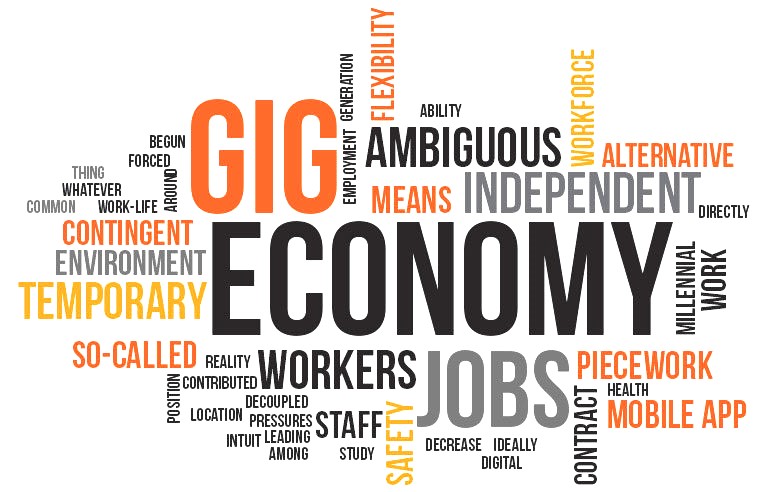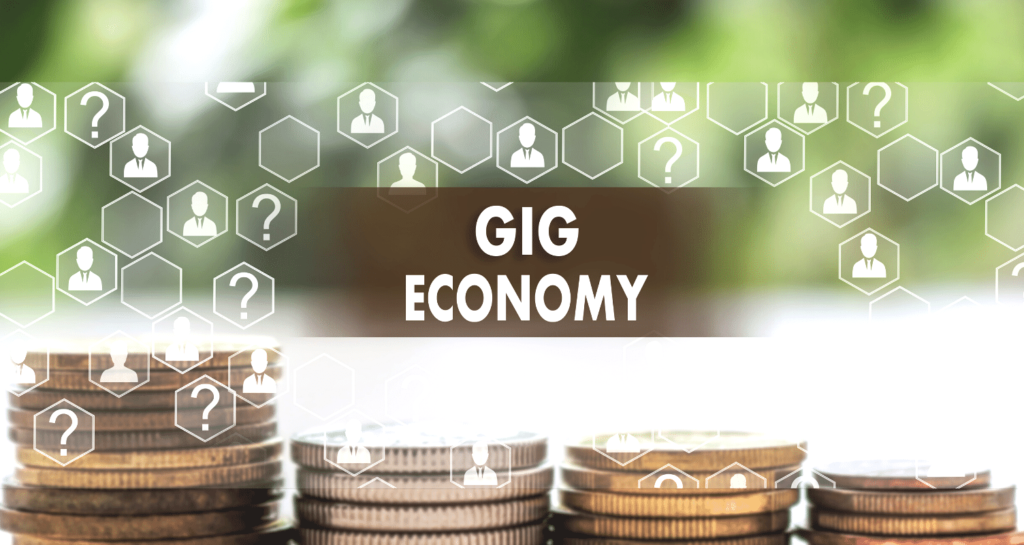Gig Economy: In recent years, the gig economy has emerged as a dynamic and transformative force in the world of work. This article will delve deep into the gig economy, exploring its impact, opportunities, and challenges. From its rise to the way it has reshaped traditional employment structures, we’ll provide valuable insights into this growing phenomenon.

The Gig Economy Unveiled:
The gig economy, often referred to as the freelance or on-demand economy, is a labor market characterized by short-term contracts and freelance work. In recent years, it has gained significant momentum, driven by technological advancements and shifting attitudes towards work.
The Gig Economy’s Positive Impact
Flexibility:
Gig workers have the flexibility to choose when and where they work, allowing for better work-life balance.
Diverse Opportunities:
The gig economy offers a wide range of job opportunities, from ride-sharing drivers to freelance writers.
Global Accessibility:
Workers can access job opportunities from around the world, breaking geographical barriers.
The Gig Economy’s Negative Side
Income Uncertainty:
Gig workers often face income volatility due to irregular work.
Lack of Benefits:
Gig workers typically don’t receive traditional employment benefits like health insurance or retirement plans.
Job Insecurity:
The absence of long-term job security can be stressful for some gig workers.
The Gig Economy’s Growth and Influence
The gig economy has grown exponentially over the years, with platforms like Uber, Airbnb, and Upwork becoming household names. Its influence extends to various sectors, from transportation and hospitality to creative and tech industries.
Navigating the Gig Economy
To succeed in the gig economy, individuals need to adapt to its unique dynamics. This includes honing essential skills, managing finances, and staying updated on industry trends.
Government Regulations and the Gig Economy
Governments are grappling with how to regulate the gig economy to ensure fair treatment of workers while fostering innovation. We explore the different regulatory approaches taken by various countries.
Gig Economy vs. Traditional Employment
We compare the pros and cons of working in the gig economy versus traditional 9-to-5 employment, helping readers make informed decisions about their career paths.
The Future of Work
The gig economy is here to stay, and it will continue to evolve. We discuss the future trends and potential disruptions in the world of work.

FAQs
Here are ten frequently asked questions about the gig economy:
What is the gig economy?
The gig economy is a labor market characterized by short-term contracts and freelance work, where individuals work on a project basis rather than as traditional employees.
What are some popular gig economy platforms?
Popular gig economy platforms include Uber, Airbnb, Upwork, TaskRabbit, and Fiverr.
Are gig workers considered employees?
In many cases, gig workers are classified as independent contractors rather than employees, which affects their access to benefits and job security.
How do gig workers handle taxes?
Gig workers are typically responsible for their own taxes and may need to pay estimated taxes throughout the year.
What are the advantages of working in the gig economy?
Advantages include flexibility, diverse job opportunities, and the ability to work from anywhere.
What are the disadvantages of gig work?
Disadvantages include income uncertainty, lack of benefits, and job insecurity.
Is the gig economy only for younger workers?
No, the gig economy is diverse and attracts workers of all ages and backgrounds.
How can gig workers manage their finances effectively?
Gig workers should budget carefully, save for taxes, and consider financial tools designed for irregular income.
Are there opportunities for career growth in the gig economy?
Yes, gig workers can build their skills and reputation to access higher-paying gigs and expand their client base.
What does the future hold for the gig economy?
The gig economy is expected to continue growing, with potential advancements in technology and changes in labor regulations shaping its future.
Conclusion
In conclusion, the gig economy has transformed the way people work and has both positive and negative aspects. It offers flexibility and diverse opportunities but also comes with income uncertainty and job insecurity. Understanding the dynamics of the gig economy is crucial for individuals looking to thrive in this evolving landscape. As it continues to shape the future of work, staying informed and adaptable is key to success.
